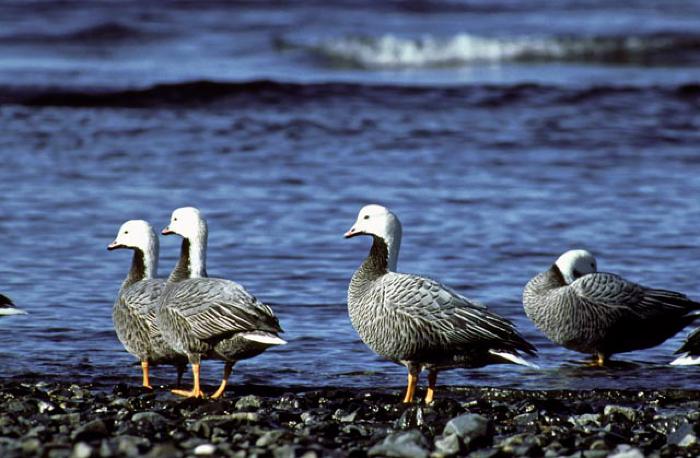Emperor Goose — Neqlleq
Neqllet taitaartut maut uksugmi. – The emperor geese always come here in the winter.

Photo: Emperor Geese on the shore of Chiniak Bay. Photograph by Dave Menke. Courtesy of the USF&WS National Digital Library.
Five species of geese are found across Alaska, four of which commonly visit Kodiak. One of the prettiest is the Emperor Goose (Chen canagica). This small bird has a black throat with a dramatic white head and neck and a yellow bill. Its distinctive round body is covered in grey feathers, each elegantly edged with black and white bands.
Emperor geese typically arrive in the archipelago between October and April. In summer, they breed in the Yukon-Kuskokwim Delta and along the coast of the Bering Sea in Alaska and Russia. As colder temperatures and ice develop, the birds fly south in search of open beaches to feed on seaweed and intertidal organisms. Most travel to the Aleutian Island, the coast of the Alaska Peninsula, or the Kodiak Archipelago.
Alutiiq hunters report that the Emperor goose population, at a historic low in the 1980s, is now rebounding. Although the birds cannot be taken for subsistence purposes due to legal protection, large gaggles of emperor geese are starting to appear, and even chase away flocks of wintering ducks.
Geese were once hunted with snares or bows and arrows. Today, they are taken with guns. Alutiiq people harvest geese for their meat and feathers. Elders recall that families used soft, warm goose down to stuff pillows and mattresses. Bird down is also an excellent fire starter. Despite the variety in species, Elders report that all geese, “taste the same!”
Emperor geese typically arrive in the archipelago between October and April. In summer, they breed in the Yukon-Kuskokwim Delta and along the coast of the Bering Sea in Alaska and Russia. As colder temperatures and ice develop, the birds fly south in search of open beaches to feed on seaweed and intertidal organisms. Most travel to the Aleutian Island, the coast of the Alaska Peninsula, or the Kodiak Archipelago.
Alutiiq hunters report that the Emperor goose population, at a historic low in the 1980s, is now rebounding. Although the birds cannot be taken for subsistence purposes due to legal protection, large gaggles of emperor geese are starting to appear, and even chase away flocks of wintering ducks.
Geese were once hunted with snares or bows and arrows. Today, they are taken with guns. Alutiiq people harvest geese for their meat and feathers. Elders recall that families used soft, warm goose down to stuff pillows and mattresses. Bird down is also an excellent fire starter. Despite the variety in species, Elders report that all geese, “taste the same!”
